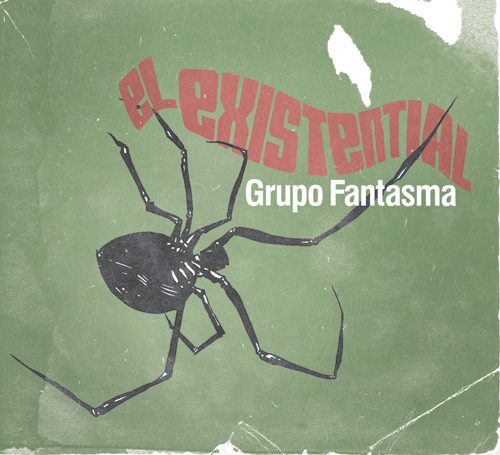
84/100
I have a love/hate relationship with Latin music. Well, maybe hate is too strong a word. Call it a love/meh relationship. On one hand much of the “Latin Sound” I hear comes from the Twin Cities radio station Radio Rey, a station seemingly dedicated to playing what sounds like an endless accordion loop (if I sound bitter it might be because the roofers working on my neighbor’s house share a singular dedication to Radio Rey – 24 hours a day 7 days a week). On the other hand you have a whole world of Salsa, Cumbia, Bolero, Mambo, Afro-Cuban, and endless other styles that are every bit as innovative and interesting as any other kind of music you can hear elsewhere. And one of those bands that falls far from the “meh” category is Austin’s Grupo Fantasma. The eleven piece band has been playing inventive Latin music for the better part of a decade now – a gig that has earned them bona fides from guys like Prince and Britt Daniel – both of whom regularly request that Grupo back them up onstage. Grupo recently released their fifth studio album Existential, which is an advised listen for a music fan of any stripe.
Existential blends a whirlwind of musical styles together into a melting pot of upbeat, highly danceable tunes. The leadoff track “Realizando” incorporates a straight up funk rhythm with a blaring brass section with squalling psychedelic guitar accents. “Sacatelo Bailando” blends Tito Puente era Salsa with a fiery guitar line that recalls Carlos Santana. West African sounding guitar even shows up in tracks like “Hijo,” lending an afrobeat influence to the tune’s reggae meets tropicalia sound. The record is overwhelmingly hip friendly with most of the tunes taking on dance rhythms that defy the body’s ability to keep still. Even slow burners like “Juan Tenorio” are instant toe tappers. And when the band really lets loose, such as in the sizzling brass of “Calor” or the psychedelic funk odyssey “Telarana,” dancing isn’t so much a suggestion as it is an order.
Grupo Fantasma will be playing songs off of Existential and more on their national tour, which just so happens to stop at our very own Cedar Cultural Center this Thursday. Grupo’s live performances are supposed to be legendary so I would encourage you to make it down if you can. Don’t be afraid of the “World Music” title or tenuous connection to the kind of music they play on Radio Rey – these guys have a sound that should appease any music fan, Latin or otherwise.
— Jon Behm
Grupo Fantasma – El Consejo
Grupo Fantasma: Site
.
COOKING CAN BE RECIPE FOR A BETTER LIFE
The Columbian (Vancouver, WA) November 4, 1999 | ELIZABETH HOVDE, Columbian staff writer What an intimidating experience: learning to cook. Knowing the differences between various types of flours, how to thicken sauces and gravies without destroying the taste, even knowing how long to boil an egg all were mysteries.
The daughter of a highly talented and capable Dutch woman who grew up on farms eating whole foods plucked from the Earth, I eventually learned the basics. I knew how to shop for affordable ingredients and make meals for myself by the time I was a teen and out on my own. It is hard to imagine the lost feeling that grown adults, mothers and fathers, must experience when staring at a bag of brown rice or dried beans and not knowing how to make the goods into something edible.
In her Oct. 30 article, “Staples are tough sell at food banks,” Columbian reporter Anne Hart found that low-income community members who rely on local food banks for some of their meals are choosing hot dogs over fresh meat even salmon. They pick meals-in-a-box over staple foods, opting for quick-fix menu items that are not only less nutritional but most often more costly. Free staple foods sit on the food banks’ shelves going unused.
Why? Some folks no doubt make the choice out of convenience, just as people with plenty of money do. But Virginia Hirtler and other food-bank volunteers say many of their patrons simply lack cooking know-how. Without the skills to prepare meals that stretch a budget further, people in need carry these food bank preferences into grocery stores on already slim food budgets.
To combat the trend, Friends in Service of Humanity in Orchards gives away recipes with staple food items to try to convince patrons to take away the provisions that provide more meals for families. Hirtler, who volunteers for FISH, has even produced three cookbooks that outline recipes using common ingredients the food bank receives. In 1984 large amounts of cheese were available to patrons, so she compiled a cookbook of cheese-related meals. More than 3,000 copies of the cookbooks have gone to those in need. website how long to boil an egg
Hirtler is setting out to update the latest cookbook, adding many staple-heavy recipes and tips for using basics. Hirtler is also looking for someone to donate printing services for the books, so the food bank can get them into the hands of those who turn away staples or ditch them after being talked into taking them home because they don’t know what to do with them.
To help those in need learn to cook and make economically smart grocery-shopping choices, the North County Community Food Bank in Battle Ground hopes to offer cooking classes starting this February. The organization has done cooking classes in the past, but making it a regular offering is difficult: The bank needs a certified kitchen to teach in for free (a place where public food can be served), volunteer instructors to lead classes and funds to buy staples and coordinate the class schedule.
Kay Schauer, a home economist with the Washington State University Clark County Cooperative Extension’s family food and nutrition program, will also teach classes for people on low incomes if kitchens are available at no cost. If you have a certified kitchen and can donate some space to these efforts, call Schauer at 254-8436 or the North County Community Food Bank at 687- 7126 and ask for Elaine Hertz. To help in the cookbook effort, call Hirtler at FISH, 256-2440.
Charity that works “Give me a fish and I’ll eat for a day; teach me to fish and I’ll eat for a lifetime,” the old adage goes. And yet often we don’t realize what others don’t know and that so many of us have rich knowledge to give. howlongtoboilaneggnow.com how long to boil an egg
It is far easier to donate food baskets, or vote to increase government programs that, although well-intended, often fail: too big, too impersonal. Unfortunately, our nation’s collective goodwill has replaced charity that does work: one-on-one relationships, discipleship and teaching. This type of charity takes real time and effort but can transform lives.
Is there someone in your sphere of influence who could benefit from what you know? A young teen who could learn the skills she may need later in life? A single mother who doesn’t know how to make mashed potatoes, so she opts for prepackaged noodles? Do you know a family that has trouble making ends meet and lives without a budget to help guide them?
Fewer people will live in poverty if more one-on-one relationships are pursued and if the transfer of basic life skills from family to family can give people in need the tools required to build steps to self-sufficiency.
ELIZABETH HOVDE, Columbian staff writer
Visited 1 times, 1 visit(s) today









